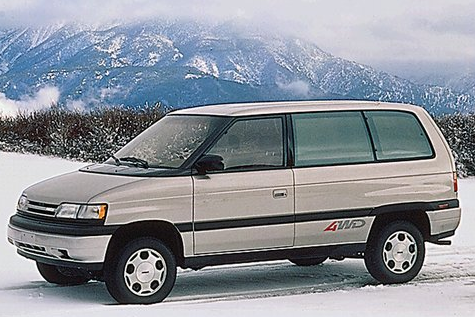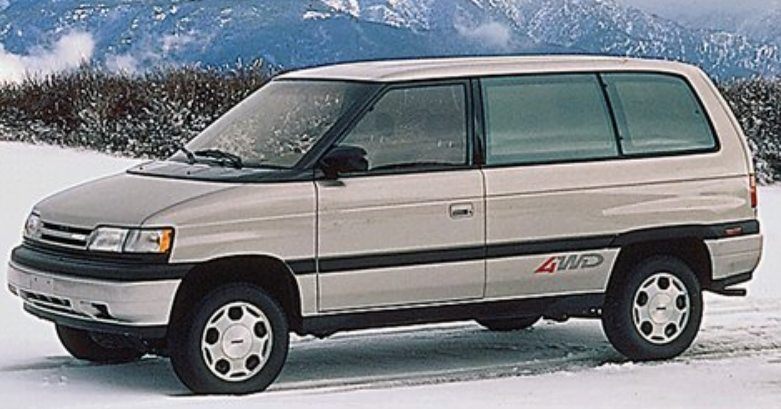
Mazda may feel like a relative newcomer to the American car market, but the plucky Japanese carmaker is actually a U.S. sales veteran. In 2020, Mazda will celebrate 50 years of doing business Stateside–and that half-century doesn’t include several years of Canadian sales prior to that.
Mazda, like other Japanese car brands doing business in the U.S., is best known for a few core products. Legendary for the rotary-powered RX-7 and RX-8, Mazda is also well known for the compact Mazda 3 and midsize Mazda 6. But Mazda has also produced several models that didn’t really resonate with shoppers and are seldom talked about today.
Presented here are five such Mazda models, each of which is rarely discussed, and even more rarely seen. If you’ve spent time with one of these forgotten Mazdas, tell us about it—we’d love to hear what you remember. Check out these forgotten Mazdas:
Forgotten Mazdas
1989-1998 Mazda MPV
The Mazda MPV had a long run, but it wasn’t an especially successful one. Looking for a piece of the exploding minivan market, Mazda developed the MPV specifically with American shoppers in mind. The MPV was one of the first minivans to offer a V6 engine and all-wheel drive, but it was rear-drive in base form–a design element that resulted in a raised load floor and contributed to a somewhat ungainly silhouette.
Subsequent generations of the MPV would boast a more conventional design, with front-wheel drive, tidier exterior dimensions, and lower base prices.
1991-1994 Mazda Navajo
Having gone it alone on an American-market van, Mazda sought a U.S. partner when it decided to test the compact-SUV waters. In the case of the Navajo, “partner” wildly overstates Mazda’s involvement in the project. Little more than a mildly retrimmed version of Ford’s insanely popular Explorer, Navajo was retailed only in 2-door form.
Limited by capacity constraints at its Louisville assembly facility—the only factory cranking out Explorers–Ford made only 2-door Navajos available to Mazda. Unfortunately, demand even for 2-door Explorers was light, as family-oriented customers overwhelmingly preferred the 4-door trucks. After five years of trying to sell Ford’s leftovers, Mazda finally gave up on the Navajo. Today, Navajos are a rare sight, made rarer by the fact that most folks that stumble upon one just assume they’re looking at an Explorer.
1992-1995 Mazda MX-3
Anxious to mimic Honda’s success with the popular and well-reviewed CRX sporty 2-seat hatchback, Mazda rolled out the MX-3 for 1992. A little larger than the CRX, the MX-3 seemingly enjoyed two advantages over the Honda: A (tiny) rear seat, and an available (tiny) V6 engine.
The MX-3’s rear seat would never do for adults, but could accommodate children in an emergency, something the CRX’s parcel shelf could not do. More interesting was the MX-3’s available V6. Displacing just 1.8 liters, the tiny 130-horsepower mill remains to this day the smallest V6 engine ever sold in the U.S. Still, despite positive media reviews, the MX-3 sold poorly, and was discontinued after just four model years.
1992-1995 Mazda 929
The 1992-1995-generation 929 is a noteworthy Mazda for two reasons. First, it was the last rear-drive American-market Mazda car not powered by a rotary engine. And, it was the brand’s last large sedan designed to be sold as a Mazda (more on this point in a moment.)
The 929 fought for customers with the likes of the Nissan Maxima and Toyota Cressida, and largely lost that battle. Though the 929 was generally well regarded, the Nissan and Toyota near-luxury offerings enjoyed better name recognition and more advertising support.
The 929 was replaced in Mazda’s lineup by the Millenia, a car that was originally destined for another brand (see below).
1995-2002 Mazda Millenia
Originally conceived as entry-level luxury product, the Mazda Millenia was meant to be one of two launch vehicles for a new U.S. luxury channel dubbed Amati. As a direct competitor to the recently launched Acura and Lexus brands, Amati would have given Mazda access to wealthy customers who would otherwise not have considered the maker’s products. A larger, rear-drive V12-powered car, tentatively dubbed Amati 1000, was to be the brand flagship.
Millenia was to be the Amati 500, and was an interesting sedan in its own right. Though the Amati program failed to reach fruition, the Millenia saw production–including its unique available Miller-cycle engine. Essentially a supercharged Atkinson-cycle mill, the Millenia 2.3-liter engine employed a specific valve-timing arrangement that improved thermal efficiency. The result was 210 horsepower and an EPA 28-mpg highway rating.
Like the other Mazdas on this list, the Millenia never sold well, and was discontinued after 2002.
Forgotten Mazdas
